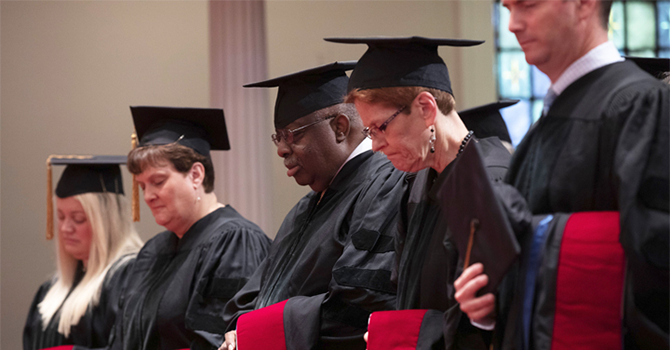Baptist Theological Seminary at Richmond held its final graduation -- its final ceremony of any kind -- on May 25, 2019. It was not exactly a funeral or a memorial service. It’s hard to describe the experience of watching an institution close.
Technically, BTSR closed Jan. 31. Legally, I suppose, there may still be a month or so of reconciling accounts and completing all the other tasks an institution must handle at the end of its life.
But the graduation, with its laughter and tears, memories and selfies, felt like the end. Speakers reminded the graduates that the school will live on in the vocations of almost 800 alumni. Graduates were encouraged to stick together, gaining strength from community.
BTSR is just one of many Christian institutions to close. In recent years, I have heard the whispered laments, in board meetings and denominational gatherings, of mergers, consolidations and right-sizing, all the while assuming that the casualty would never be my own alma mater. But now it is my own alma mater, an organization I knew was fragile. But I didn’t know how fragile.
We can blame it on the economy and that season in 2008 when everything changed. We can fault the evolving nature of higher education, with online access to schools, professors and degrees previously out of most people’s reach. We can point to the shifting nature of religion and the fact that the church is no longer seen as the beacon of innovation, hope and social justice it once was.
What we cannot do, however, is simply stand by and watch it happen. Again and again and again.
This is when we must hold fast to holy friendships to keep us honest and faithful to our calling to the collective work of the church. Theologian L. Gregory Jones describes holy friends as those who challenge the sins we have come to love, affirm the gifts we are afraid to claim, and help us dream dreams we otherwise would not dream. These three acts are significant and life-giving in individual and communal or institutional relationships alike.
No institution is perfect; institutions are created and sustained by fallen, imperfect humans. So we are compelled to ask, with the help of holy friends, the hard questions: What sins have we come to love? In what ways do we rest on our resources (endowments, real estate, human potential) rather than thinking creatively about how we might experiment and find new ways to love our neighbors?
What gifts are we afraid to claim? The church has a tradition of being innovative. We used to see a problem and aspire to solve it, leading to the birth of faith-based hospitals, schools, elder care facilities and community development corporations. We are made in the image of God -- a creating, creative God. We are all gifted with the ability to create. Yet too often, we squander our gifts because our traditions are safe, comfortable and quite attractive.
What dreams would we otherwise not dream? When an institution closes, it creates a void. There is space where something used to be. What new thing might spring forth? Who might come together around a new dream or a different vision?
In moments like this, holy friends hold up a mirror and ask us hard questions about our institutions. Where have our institutions become complacent? Where are we overconfident? Where are we afraid to take risks, and why? Who is absent from our tables and constituencies and conversations? What might happen if we loved our neighbors more than our traditions, our community service awards or our reputations? What if we took on a mindset of abundance rather than scarcity and used our resources to grow our relationships rather than our endowments? What if we invested in our future by loving the person, the place, the community right in front of us today?
Without a doubt, these questions are challenging, annoying, inconvenient and uncomfortable. It is much easier to pass budgets just a shade different from last year’s and perpetuate the status quo. It’s easier to think the “other” institutions are the ones that are more fragile than ours and to go on trying to squeeze out another year of reasonably good work.
But we were created for better than reasonably good work. Should that really even be a goal? Is that what stewardship looks like?
In reality, all of our institutions would be stronger, healthier, more creative and more resilient if we were bold enough to engage one another as holy friends, challenging each other with questions about our individual and institutional sins, gifts and dreams.
If it feels too scary to ask these kinds of questions of your own institution, start by asking friends about theirs. I suspect that they will turn the conversation right back to you, because no one wants to be in these conversations alone. We aren’t meant to be. We are meant to be in community conversation. It’s what holy friends do.








